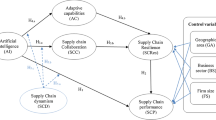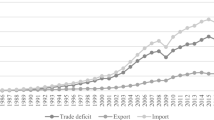Abstract
In the past, the ‘Made in the World’ label, although capturing what may lie ahead, seemed awkward and futuristic. Today, it has become a reality. An ample array of global products are built up of numerous components and modules manufactured by global networks of differentiated partners rather than within the boundaries of one national entity. The purpose of this paper is to contribute to bridging the empirical gap in the area of global operations networks and provide insights into how they change over time. The paper is based on the cases of three Danish companies and their global operations networks. It finds a number of common patterns highlighting organizational effects and managerial challenges faced by the companies regarding rapid changes in their networks configurations and capabilities. The paper details the variables determining these changes and suggests how the on-going interplay between the focal organization, its network partners, and their varying contextual conditions can be dealt with.



Similar content being viewed by others
References
Albrow M (1996) The global age. Polity, Cambridge
Balogun J, Huff AS, Johnson P (2003) Three responses to the methodological challenges of studying strategizing. J Manag Stud 40:197–224
Dicken P (2007) Global shift: mapping the changing contours of the world economy. Guilford, New York
Easton G (1992) Industrial networks: a review. In: Axelsson B, Easton G (eds) Industrial networks: a new view of reality. Routledge, New York
Eisenhardt KM (1989) Building theories from case study research. Acad Manag Rev 14:532–550
Ernst D, Kim L (2002) Global production networks, knowledge diffusion, and local capability formation. Res Policy 31:1417–1431
Farrell D (2004) Beyond offshoring: assess your companies global potential. Harvard Bus Rev 82:82–90
Ferdows K (1997) Made in the world: the global spread of production. Prod Oper Manag 6:102–109
Ferdows K (2006) Transfer of changing production know-how. Prod Oper Manag 5:1–9
Ferdows K (2008) Managing the evolving global production network. In: Galavan R, Murray J, Markides C (eds) Strategy, innovation, and change: challenges for management. Oxford University Press, Oxford
Flynn BB, Sakakibara S, Schroeder RG, Bates KA, Flynn EJ (1990) Empirical research methods in operations management. J Oper Manag 9:250–284
Gereffi G, Humphrey J, Sturgeon T (2005) The governance of global value chains. Rev Int Polit Econ 12:78–104
Ghoshal S, Bartlett CA (1990) The multinational corporation as an interorganizational network. Acad Manag Rev 5:603–625
Gulati R, Nohria N, Zaheer A (2000) Strategic networks. Strateg Manage J 21:203–215
Håkansson H, Ford D (2002) How should companies interact in business networks? J Bus Res 55:133–139
Hayes R, Wheelwright S (1984) Restoring our competitive edge: competing through manufacturing. Wiley, New York
Hayes R, Pisano G, Upton D, Wheelwright S (2005) Operations, strategy and technology: pursuing the competitive edge. Wiley, Danvers
Lewin AY, Couto V (2007) Next generation offshoring: the globalization of innovation. Booz Allen Hamilton, Chicago
Lewis MW (1998) Iterative triangulation: a theory development process using existing case studies. J Oper Manag 16:455–469
Lyles A, Salk JE (2007) Knowledge acquisition from foreign parents in international joint ventures: an empirical examination in the Hungarian context. J Int Bus Stud 38:3–18
Meredith J (1998) Building operations management theory through case and field research. J Oper Manag 16:441–454
Miles MB, Huberman AM (1994) Qualitative data analysis: an expanded sourcebook. Sage, Thousand Oaks
Mudambi R (2008) Location, control and innovation in knowledge-intensive industries. J Econ Geogr 8:699–725
Ohmae K (1985) Triad power: the coming shape of global competition. Free, New York
Pauwels P, Matthyssens P (2004) The architecture of multiple case study research in international business. In: Marchan-Piekkari R, Welch C (eds) Handbook of qualitative research methods for international business, 125–144. Edward Elgar, Glos
Pettigrew AM (1990) Longitudinal field research on change: theory and practice. Organ Sci 1:267–292
Pyndt J, Pedersen T (2006) Managing global offshoring strategies. CBS, Copenhagen
Shi Y (2003) Internationalisation and evolution of manufacturing systems: classic process models, new issues, and academic challenges. Integr Manuf Syst 14:357–368
Shi Y, Gregory M (1998) International manufacturing networks—to develop global competitive capabilities. J Oper Manag 16:195–214
Shi Y, Gregory M (2005) Emergence of global manufacturing virtual networks and establishment of new manufacturing infrastructure for faster innovation and firm growth. Prod Plan Control 16:621–631
Srai JS, Gregory M (2008) A supply network configuration perspective on international supply chain development. Int J Oper Prod Manage 28:386–411
Stake RE (2003) Case studies. In: Denzin NK, Lincoln YS (eds) Strategies of qualitative inquiry, 134–165. Sage, Thousand Oaks
Sturgeon TJ (2001) Modular production networks: a new American model of industrial organisation. Ind Corp Change 11:451–496
Van de Ven AH, Huber GP (1990) Longitudinal field research methods for studying processes of organizational change. Organ Sci 1:213–219
Vereecke A, Van Dierdonck R (2002) The strategic role of the plant: testing Ferdow’s model. Int J Oper Prod Manage 22:492–514
Voss C (2009) Case research in operations management. In: Karlsson C (ed) Researching operations management, 162–196. Routledge, New York
Voss C, Tsikriktis N, Frohlich M (2002) Case research in operations management. Int J Oper Prod Manage 22:195–219
Yin RK (2009) Case study research—design and methods. Sage, Thousand Oaks
Author information
Authors and Affiliations
Corresponding author
Rights and permissions
About this article
Cite this article
Slepniov, D., Waehrens, B.V. & Jørgensen, C. Global operations networks in motion: Managing configurations and capabilities. Oper Manag Res 3, 107–116 (2010). https://doi.org/10.1007/s12063-010-0032-4
Received:
Revised:
Accepted:
Published:
Issue Date:
DOI: https://doi.org/10.1007/s12063-010-0032-4




